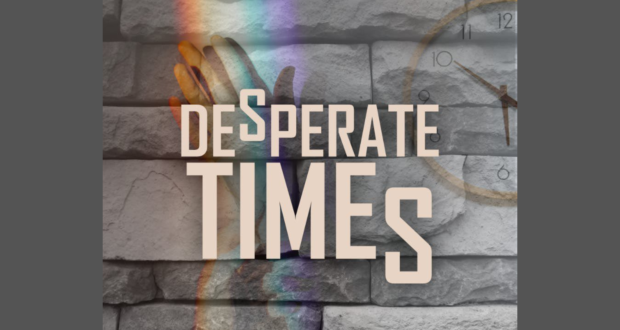Rural coming-out drama in need of more dramatic focus.Summary
Rating
Ok
Ask anyone who’s dabbled in dramatic theory or literary criticism how many story types there are, and you’ll get a range of responses citing various sources of wisdom from Aristotle onwards and attached to numbers from two to 40-odd. Notions such as “hero’s journey”, “call to action”, “rise and fall” will be mentioned, and copious examples cited to substantiate individual theories. But they nearly always boil down to a number, the consensus being that throughout history artists have been telling similar stories in their attempts to make sense of humankind’s place in the world.
The story told in Desperate Times is one that will be familiar to many who take an interest in queer culture. On a northern farm a young man thinks he’s probably gay but is hindered in exploring his sexuality by his isolated rural existence and the fierce denial of his mother. Mum pressures Son to go to the local pub and foster friendships with loutish straight contemporaries who do nothing but exchange belittling banter and talk of women as sex objects. Son randomly meets an out gay Man, who offers to save him from a closeted country life by introducing him to the glamorous freedoms of “The city”, but there’s unfinished business back on the farm…
One of the first things one notices is that this is a company of young actors multi-roling parts that don’t match their actual ages: Son is if anything older than Dad, and there’s probably not more than a few years’ span between the whole family unit. Once you accept that, it’s not a big problem, but it inevitably begs comparison with student productions where of necessity actors play characters not of their own generation.
Another potentially distracting factor is the inconsistent production values on display. One scene features authentic hospital gowns and scrubs, but elsewhere imaginary wine is poured from a bottle, and at the start of the play we find Dad reading that morning’s London Metro newspaper. The producer friend who accompanied me was extremely irked that the production hadn’t sourced a local paper, and it’s true that amateurish details like this can detract from one’s goodwill towards a show.
In terms of characterisation, Son is incredibly naïve considering the modern setting. He has a smart phone but is unaware what “Bi” means, and baffled by the question “Top or bottom?”. He looks around mid-20s but behaves as if he’s still in his teens. The straight guys down t’pub are crude stereotypes that get some laughs because of their unbelievable laddishness, and the female characters aren’t much better served by the script.
There’s something a little sinister about the Man who arrives to catalyse Son’s coming-out, brushing off Son’s claims to straightness by insisting that he “oozes queerness”. What secrets is Man hiding, and why is he trying so hard to get Son to abandon his family? That’s the faint note of intrigue that takes us up to the interval. Sadly, in the second half the unpacking of Man’s backstory is rather lame. He’s already told us he likes waving his willy at strangers in pub toilets, so it’s hardly surprising to learn that this has got him in trouble in the past.
A quite interesting theme of biological family versus queer community is touched upon but not explored with any insight, and Son reaches the end of the play with a little more confidence but has actually been on a very short journey. When local lad Jonny (the only character blessed with a name) reveals an entirely predictable secret, the effect is to consolidate the impression that writer Adam Laboda has thrown ideas around his script in a scattershot manner, hoping perhaps that they might achieve some sort of cumulative significance. But the collective noun for a group of undeveloped storylines is not “a coherence”, and the overall effect is a frustrating sense of a rudderless play that’s been assembled more with hope than precision.
There’s no doubt that stories such as these can be – and indeed should be – told and retold as many times as necessary. They have a social purpose and an educational and inspirational function. But to be worth telling they really need more focus and development than Desperate Times, which touches so lightly and inexpertly on its themes that one can’t help but conclude it falls some distance short of being work that adds constructively to the sum of narratives we collectively feel the need to hear again and again in different iterations.
Written and directed by: Adam Laboda
Produced by: Trudi License for Laboda Productions
Desperate Times plays at Lion and Unicorn Theatre until 13 May. Further information and bookings can be found here.
 Everything Theatre Reviews, interviews and news for theatre lovers, London and beyond
Everything Theatre Reviews, interviews and news for theatre lovers, London and beyond



